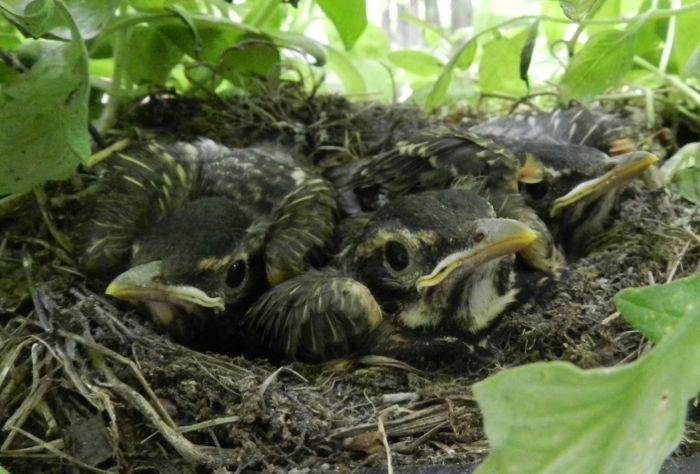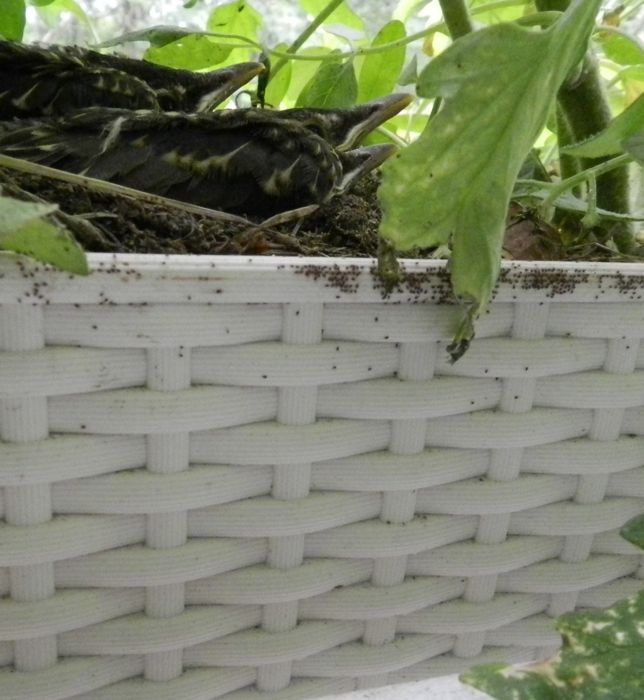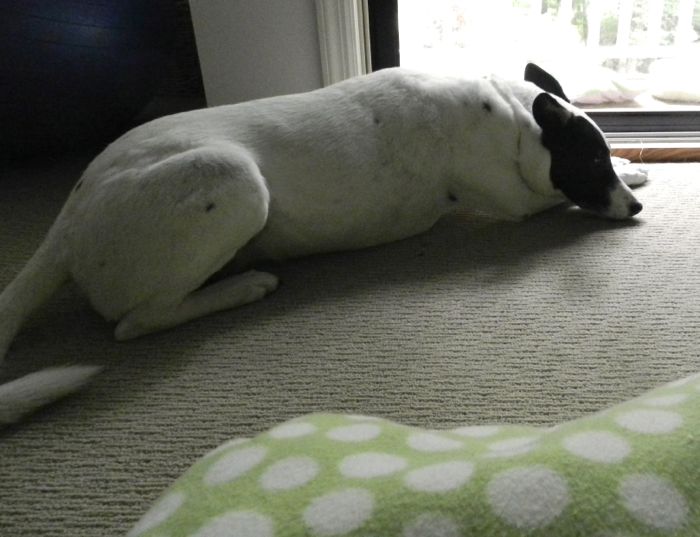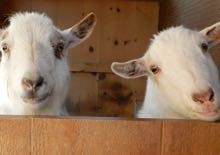The remaining three robin babies are making a ruckus, and they’re so demanding of food that the window box is shaking.
They’re eager to finish growing and leave the nest.
It’s no longer a comfortable home. It’s more than just overcrowded. It’s swarming with mites.
There are several varieties of mites that infest wild bird nests. They are all blood-sucking. They need a host for their meals, and their entire lifecycle is on the birds. But, as you can see, their population can swell beyond what the birds can contain. The mites will look for new hosts, and although they prefer birds, they’ll jump to dogs and humans. They’ll invade your house, looking for a meal. It is a good thing that I’ve banned Lily from the porch.
This is why you don’t want wild bird nests in your coops. Once your flock gets mites, it’s very, very hard to eliminate them entirely. In almost 20 years of chicken keeping, I’ve never had a mite infestation, and I don’t want to start now. I’m worried that, unknowingly, I’ve already exposed my hens to these mites. From now on, the porch door remains closed. Once the last three robins leave the nest, I’ll be removing it, and the entire contents of the window box, including the dirt (and, sadly my yet to ripen tomatoes) into a plastic garbage bag and throwing it out. The dog beds are old. They’ll be discarded, too. The porch will be scrubbed. I will not allow robins to nest on my porch again. There are plenty of other places for them to live.
Nature is not always pretty.





Wow!!! Sorry that you have to go through this.
Oh no. :( I will keep my fingers crossed that no one else is exposed to the mites. Ugh. And here you thought you were doing a good thing, letting them live there. I would have never thought of mites. I will think twice about how “cute” a birds nest is next time I see one on our property.
Could you dose the remaining babies with mite powder or spray or something before they go?
The adults have the mites, so they’ll simply spread back again.
We had house sparrows nest on our porch about 2 years ago. Like your robins – it was adorable to watch the babies grow up. But then they left the nest and the mites that were feeding on them invaded my home. It did not matter if what we did – those little things were everywhere! They are so tiny that they can get into your house even with the doors and windows closed.
After tons of laundry and gratuitous amounts of diatomaceous earth we still had a problem. After some research we found that fipronil, the ingredient in Front Line, would kill them. A few drops on the cat and the problem immediately started to get better. (We had been using Advantage on our cat as Front Line doesn’t kill the fleas in our area. Now we rotate through both.) It may be a good idea to put some on Lily in case she already has been exposed. Do you think it would also be worth it to sprinkle some poultry dust on the porch to lower the load of insects?
I’m itching just reading your comment. No signs of mites on the dogs or in the house. Lily is super-sensitive (like the Princess and the Pea) so I’m hoping we’re okay.
Your last line says it all…….All we can do is live and learn.
You could cut a few small pieces of pest strips and stick them underneath their nest with a screw driver or a long stick. That way they won’t be able to get to it and it does a good job of protecting the youngs.
We do that to protect the Purple Martin chicks from mites.
Wish I’d worried about this sooner. But, they should fledge in the next day or so. Fingers crossed.
Eeek! Poor you! As if you weren’t busy enough already.
We’ve never (yet) had mites in our hen houses, but I have a friend who seems to have an ongoing battle year on year in her coops.
Bad luck, Terry. Just as we were all so envious about the robin family too. :(((
Thinking of you with lots of sympathy.
PS Have a coffee on me, since I can’t help out in a more practical way!
…and to think some people bring bird nests indoors for décor purposes. I certainly wouldn’t!
Your fledglings should be leaving the nest soon. I’m surprised another one hasn’t already.
This post was making me itch too! After hearing about Lymes disease on Fresh Air yesterday, and this post, I maintain my stance about nature: it still makes me nervous.
Yikes!! Good to know! I was so jealous about your adorable little nest. Lesson learned.
Scratching head…….
I noticed you and the guys moving the rabbit hutch this afternoon. Is it mite infested also? Maybe thats why Phoebe spends her time in the little barn instead of her hutch? Just wondering.
Luckily not mites. Ants and beetles. It’s an old hutch and it’s been so damp that it’s not worth saving.
I stand corrected: maybe moving the rabbit pen/hutch to a cooler spot for the summer?
The word mite is one of the worst four letter words ever. Mites can make life miserable for birds and chickens AND humans if they’re allergic and mites can kill the vulnerable–baby birds and chicks as well as the older ones if not dealt with. They do not go away on their own. I know this from decades of experience and learning the hard way. As we know, baby birds fledge not just because they want to go or are they’re crowded, but because of mites. If a fallen escapee is put back in the nest, it hops out again. It’s probably trying to get away from them and the warm, moist nest that’s been a perfect breeding ground. Unless the bird can take a dust bath and has access to dirt, I don’t know how it’s going to get rid of mites. As I was growing up, my parents were often brought baby or injured birds. They weren’t rescue experts, but they just learned by doing because there was no one else to do it. And there was the old bird lady whose house was filled with little cages of baby birds that people had brought her during baby bird season. Mites! I was particularly sensitive to mite bites–itching like measles. I’m sure birds feel the same. (A nightmare if I went to school or work with even one.) I’d have to shampoo with dog flea soap. One of my vets recommended Sevin Dust, but I always got the poultry dusting powder from the feed store that had a picture of a chicken on it to play it safe. When I took a baby Silkie chick to be checked out, the vet told me that with a chick I should put the powder in the palm of my hand first and then rub all over, avoiding eyes and beak, of course. (The powder works great for ants!) Sorry for the long speech.
I am so sorry, too, Terry, for this extra thing to worry about and deal with. I hope it ends ok for all. You’ve tried so hard to make everything safe and nice for the Robin family, like you do for everyone else. Wishing you all well.
i’m puzzled – last year – no. – it was three summers ago. mu cat dropped a tiiny baby robin at my feet and said here, ma, take care of it.
i brought it in, kept it in a cat carrier, kept that in the kitchen, when the bird thrived and got bigger, kept him locked in the bathroom, in the tub until he got out.
never saw a mite.
now that’s strange. if there’s a spider around, i’m @ home (apparently) i’ve seencentipedes, and japanese lady-bugs and doodle-bugs and – well, mention mosquitoes, and one will fly out of nowhere just to land on me and tics and fleas and ants – i keep them out of the house by feeding them sugar outside – and chiggers – but no mites.
and i’m wondering if all these other insect pests i’ve mentioned, eat mites
i’d happily box you up a pound of mosquitoes and mail them off to you if you’d like the natural cure!
Plenty of mosquitos here, and I’m a magnet :) It takes awhile for the mites to breed, and we’ve had very warm and damp weather, so the infestation is particularly severe.
We have a barn swallow nest under our eaves (of the place we humans live.) I tried to hose down the beginning of nests, but one little mama built her nest on the sly and got those eggs in before I knew what hit me. As soon as those little ones are gone, I am spraying! With something! What? Water to start with, scrubbing out the nest material.
Throw out the nest, don’t put it in the compost, etc. I’m going to scrub my porch with soap and water and then I’ll spray all cracks with Permethrin.
Poor little guys. I hope Baby #1 is out there safe.
So if you do have mites what are your recommendations. The bird that has her belly feathers gone is pale faced. Everything I have read points to mites. I have checked every bird every week as an on going ritual For the last 4 months. Never seen a mite . I have sprayed feet with garlic oil during the inspection and sprayed it under wings, butt. Also put DE in the run. And when cleaning coop and change bedding always use a pistol to spray DE while birds are out ranging. So far I have seem some in the run so I m assuming I have in the coop. The coop is situated near a tree and close to a small row of conifers/woods. So there are lots of wild birds round bt none have been in the coop. What are your recommendations for mite Prevention. There is so much conflicting info in the web when I search.
If you don’t see mites (have you checked at night?) then it’s something else. I’ve seen feather loss due to many reasons, and sometimes simply that they are very good layers.I have a FAQ here.
Have seen mites in run red ones. Nothing in coop or on birds, thanks terry.
Terry , perhaps dust the porch with Food grade DE first, then clean it… does Phoebe have a differant house now?
Because it’s a porch, it will be easy to sluice lots of soapy water over. It’s open to wind and rain, so the DE will blow off. But, I’ll dust it into cracks!
Yes, Phoebe has a new house. The wood in the old one was getting punky, and ants had moved in.
My little one and I are gatherers of empty nests. No more, though!
Thanks for the info. I have been supicious of our chickens’ feather loss ( some from rooster being on their backs and some around their vent areas). Will be moving their coop and cleaning out with DE this Sunday. They are way out in a field at the farm and, although I’d like to spy on them at night for mites, I can’t brave the mosquito gauntlet that would be necessary to get there. So itchy now….